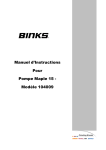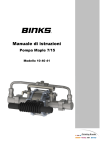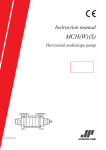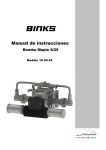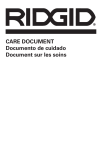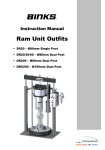Download Central Pneumatic 97521 Instruction manual
Transcript
Instruction Manual For Maple 15 - Pump Model 104009 Instruction Manual Page 2 of 28 Issue: 2.2 Instruction Manual Index Section 1.1 1.2 1.3 1.4 General Description Operating Principle Specifications Dimensions and Mounting Details 2.1 Important Safety Information 3.1 Installation - General 4.1 4.2 4.3 4.4 Parts Lists Main Pump Parts Lists Air Motor Parts Lists Fluid Section Parts Lists Reference 5.1 5.2 5.3 Maintenance – Air Motor Assembly Procedure Maintenance – Fluid Section Assembly Maintenance – Final Pump Assembly 6.1 6.2 Maintenance - General Maintenance - Fault Finding 7.1 7.2 Spare Parts Lists Accessories Page 3 of 28 Issue: 2.2 Instruction Manual General Description – Section 1.1 High Quality materials and surface treatments are used in the construction of this pump to ensure both extended operational life and good future appearance. The Maple pump is a horizontal piston pump for pumping Solvent / Waterborne Paints, Solvents and other suitable materials. An Ø125 x 50mm stroke air motor is used to drive two fluid sections giving a combined output of 0.375 L per cycle. The unit combines an energy efficient air motor with low shear fluid section technology from the range of Smart Electric Pumps. The Maple Pump achieves a reciprocating drive by using high technology ground and lapped steel spool and sleeve air valves to control the air motor reversal, providing reciprocating motion. The air valve design (patent pending) ensures a positive magnetic detent for the main and pilot air valves thus removing the possibility for a stall condition. The air motor also utilises the Binks Low Ice quick exhaust technology to prevent air valve freezing conditions when high cycle speeds are employed. Equal thrust on each stroke due to the horizontal configuration incorporating the dual piston rod design gives a balanced fluid pressure output and reduces fluid pressure fluctuations to a minimum. The air pump is furnished with twin exhaust mufflers to control exhaust noise emission. An adapter kit is available to facilitate connection to a piped exhaust system if required. A 1/8” Port is incorporated into the main air valve to facilitate an optional cycle counter. Complies with current relevant European and US Legislation Page 4 of 28 Issue: 2.2 Instruction Manual Operating Principle – Section 1.2 The Assembly comprises of:• • • • • • • Central Air Piston and ‘change over’ Valves 2 off Quick Exhaust and muffler assembly 2 off Dynamic Chambers and Fluid Pistons 2 off Fluid Pressure Chambers each complete with Suction and Pressure Ball Check Valve Assemblies 1 off Fluid Inlet Manifold 1 off Fluid Outlet Manifold Support Bracket The Pumps have horizontally opposed positive displacement pistons connected to a common reciprocating air motor piston. The pneumatically driven piston actuates pilot air control valves at the end of its travel producing an air logic signal to shuttle the spool valve initiating the opposite stroke. The air pilot valves contain no springs. They are operated by magnetic force and reset by the main piston air supply and retained in position by a magnetic detent. The main spool valve is air piloted and contains two exhaust ports. Both the pilot valves and the main spool valve are easily removable. There are no external air pilot hoses. The air logic and exhaust ports are internal. Simply mounting the spool valve and the pilot valves assures that the logic circuits are connected properly. The air cylinder exhaust air is channelled through two independent quick exhaust valves to minimises piston reversal time. The “4-Ball” fluid section design refers to the two sets of ball checks. Each fluid chamber has an inlet and outlet ball check, the inlet check is uniquely positioned in the piston saving space and reducing the overall weight of the pump. The inlet and outlet ball checks are connected by a common inlet manifold and outlet manifold respectively. A bellows provides the fluid seal on the connecting rod within the inlet chamber, whilst a main piston seal maintains the pump fluid pressure within the pressure chamber. When the main piston seal starts to pass fluid due to wear, any leakage passes into the inlet chamber. Page 5 of 28 Issue: 2.2 Instruction Manual Specification – Section 1.3 Specification 50 mm 1.97 ins Pump Nominal Stroke Pump Ratio 3:1 0..375 Litres 0.10 US Gall Nominal Flow Volume / Cycle Fluid Output @ 60 cycles/min 22.5 Litres / min 6.0 US Gall / min Maximum Recommended Continuous Cycle Rate 20 Cycles /min Maximum Recommended Intermittent Cycle Rate 40 Cycles /min Fluid Inlet / Outlet Connections 1” Sanitary 0.17 SCFM (4.8 L/m) @ 45PSI (3.1 Bar) 0.33 SCFM (9.3 L/m) @ 90 PSI (6.2 Bar) Air Volume / cycle Air Flow @ 15 cycles/min 6 bar Air Flow @ 30 cycles/min 6 bar Air Quality ISO 8573.1 Class 3.3.2 # See Note 5 CFM (142 L/min) 10 CFM (283 L/min) Dirt 5 microns Water -20ºC@7bar (940ppm) Oil 0.1mg/m³ 21 Kg 46 Lb Total Weight of Pump # Note: Class 3.4.2 Air Quality (Refrigerant dried - water +3ºC@7bar) may be used, however, above 15 cycles/min optional heavy duty mufflers 192821 or piped exhaust system should be used. Page 6 of 28 Issue: 2.2 Instruction Manual Dimensions and Mounting Details – Section 1.4 For Piped Exhaust Air, remove mufflers and add 192803 Plug and Adapter 192779 for 1” NB Hose Page 7 of 28 Issue: 2.2 Instruction Manual Important Safety Information - Section 2.1 Directions for Working Safety This Product has been constructed according to advanced technological standards and is operationally reliable. Damage may, however, result if it is used incorrectly by untrained persons or used for purposes other than those for which it was constructed. The locally current regulations for safety and prevention of accidents are valid for the operation of this product under all circumstances. International, national and company safety regulations are to be observed for the installation and operation of this product, as well as the procedures involved in maintenance, repairs and cleaning. These instructions are intended to be read, understood and observed in all points by those responsible for this product. These operating and maintenance instructions are intended to ensure trouble free operation. Therefore, it is recommended to read these instructions carefully before start-up. Binks cannot be held responsible for damage or malfunctions resulting from the non-observance of the operating instructions. These instructions including regulations and technical drawings may not be copied, distributed, used for commercial purposes or given to others either in full or in part without the consent of Binks. We reserve the right to alter drawings and specifications necessary for the technical improvement of this product without notice. High Pressure/Electrostatic Warning High pressure equipment can be dangerous if used incorrectly, serious bodily injury may occur if the following instructions are ignored. Installation and maintenance should only be carried out by suitably qualified personnel. 1. Before attempting any work on a high-pressure system ensure material pump, hydraulics, compressed air motor are isolated where relevant. 2. Relieve all pressure from the system. Note: It is possible for pressure to get locked into a system, therefore, ensure all sections of the system are checked thoroughly for remaining pressure. 3. Take care when releasing fittings 4. Always replace worn hoses immediately 5. Never plug a leak with your finger, adhesive tape or other stop gap devices Always ensure equipment is suitably earthed before running, to avoid any chance of electrostatic build up. Equipment Misuse Hazard Equipment misuse can cause the equipment to rupture or malfunction and result in serious injury. • • • • • • • • • • • This equipment is for professional use only. Read all instruction manuals, tags, and labels before operating the equipment. Use the equipment only for its intended purpose. Do not alter or modify this equipment. Use only genuine Binks parts and accessories. Check equipment daily. Repair or replace worn or damaged parts immediately. Do not exceed the maximum working pressure stated on the equipment or in the Technical Data for your equipment. Do not exceed the maximum working pressure of the lowest rated component in your system. Use fluids and solvents which are compatible with the equipment wetted parts. Refer to the Technical Data section of all equipment manuals. Read the fluid and solvent manufacturer’s warnings. Route hoses away from traffic areas, sharp edges, moving parts, and hot surfaces. Do not expose hoses to temperatures above 82°C (180°F) or below —40°C (—40°F). Wear hearing protection when operating this equipment. Do not lift pressurized equipment. Comply with all applicable local, state, and national fire, electrical, and safety regulations. Page 8 of 28 Issue: 2.2 Instruction Manual Important Safety Information - Section 2.1 Fire, Explosion and Electric Shock Hazard Improper grounding, poor ventilation, open flames or sparks can cause a hazardous condition and result in a fire, explosion, or electric shock. When installed and operated in accordance with its instructions, the pump is approved for operation in Zone 1 (Europe) & Division 1 (North America), hazardous locations. (ATEX Cat 2) • • • • • • • • • • • Electrical equipment must be installed, operated, and serviced only by trained, qualified personnel who fully understand the requirements stated in this instruction manual. Ground the equipment and all other electrically conductive objects in the spray area. After grounding test with ohmmeter to ensure earth continuity is 1 ohm or less. Keep all covers tight while the motor is energized. If there is any static sparking or you feel an electric shock while using this equipment, stop spraying/dispensing immediately. Do not use the equipment until you identify and correct the problem. Provide fresh air ventilation to avoid the build up of flammable fumes from solvents or the fluid being pumped. Keep the pumping area free of debris, including solvent, rags, and gasoline. Electrically disconnect all equipment in the pumping area. Extinguish all open flames or pilot lights in the spray/dispense area. Do not smoke in the spray/dispense area. Do not turn on or off any light switch in the spray/dispense area while operating or if fumes are present. Do not operate a gasoline engine in the spray/dispense area. Hot Surface Hazard • • The electric motor becomes hot during operation, and the heat may be transferred to other connected equipment. To reduce the risk of burning yourself, do not touch the motor surfaces while it is operating. Before servicing, allow the motor to cool. Keep flammable materials and debris away from the equipment. Pressurized Equipment Hazard Spray from the gun/valve, hose leaks, or ruptured components can splash fluid in the eyes or on the skin and cause serious injury. • Do not point the gun/valve at anyone or at any part of the body. • Do not stop or deflect leaks with your hand, body, glove or rag. • Spraying/dispensing; clean, check, or service the equipment. • Tighten all fluid connections before operating the equipment. • Check the hoses, tubes, and couplings daily. Replace worn, damaged, or loose parts immediately. Permanently coupled hoses cannot be repaired; replace the entire hose. Toxic Fluid Hazard Hazardous fluid or toxic fumes can cause serious injury or death if splashed in the eyes or on the skin, inhaled, or swallowed. • Know the specific hazards of the fluid you are using. • Store hazardous fluid in an approved container. Dispose of hazardous fluid according to all local, state and national guidelines. • Always wear protective eyewear, gloves, clothing and respirator as recommended by the fluid and solvent manufacturer. Moving Parts Hazard • Keep clear of all moving parts when starting or operating the pump. . Page 9 of 28 Issue: 2.2 Instruction Manual Installation – Section 3.1 Mount the pump securely and position the pump at a convenient height (below the lid height of the paint container), to allow for maintenance, visual observation, and periodic inspection. The wall mount bracket is included with all pumps. Exhaust silencer kits are available for these pumps if the air exhaust is required to be piped away from the pump rather than exhausting locally through the mufflers. The Pump Mounting Frame must be connected to a suitable earth ground to ensure that there is no possibility of static build up. Attach suitable flexible hoses (20 bar working pressure) to the inlet and outlet connections. e.g. 25 mm NB Inlet and 25 mm NB Outlet hose. Connect a suitable 3/8 NB air hose and ½” Pressure Filter Regulator to the air motor. (Filter rated at minimum 1000 L/min) No additional air lubrication is required as piston o-ring lubricant is applied during assembly or repair. If an air lubricator is used to prolong piston seal life (for example continuous duty at high pump cycle rates) then this must be maintained as the lubricant removes the piston seal assembly grease. Set the pump speed to a slow cycle rate and start the pump to remove any air from the fluid circuit. Inspect for any air or fluid leaks. Set the pump cycle rate to achieve the required paint volume and then adjust the system back pressure regulator and pump air pressure to achieve the desired system fluid pressure. A Back Pressure Regulator should be mounted in the paint system return line. The return line ‘back pressure’ regulator responds to the changes in system fluid flow demand, (due to variable paint usage) by dynamically adjusting the paint flow rate returning to the system paint tank, thus maintaining the set pressure. Page 10 of 28 Issue: 2.2 Instruction Manual Parts List – Section 4.1 Parts List - 104009 Main Pump Assembly ITEM PART No DESCRIPTION 1 ------ AIR MOTOR ASSEMBLY 1 2 ------ FLUID SECTION ASSEMBLY 2 81 82 192777 192834 MUFFLER INLET MANIFOLD 2 1 83 84 85 192835 192009 192206 OUTLET MANIFOLD SANITARY CLAMP SANITARY GASKET 1 4 4 Page 11 of 28 QTY REMARKS Issue: 2.2 Instruction Manual Parts List - Air Motor Assembly ITEM PART No 3 0115-010102 161998 161993 161994 DESCRIPTION QTY REMARKS MAIN AIR VALVE ASSEMBLY Ø125 x 2 O-RING Ø20.35 x 1.78 O-RING Ø4.47 x 1.78 O-RING 1 2 2 4 161995 162707 162703 162704 Ø19.5 x 3.00 O-RING PISTON SEAL SHAFT SEAL SHAFT BEARING 2 1 2 2 163920 165123 165135 165528 165960 M6 x 30 CAP HD SCREW (ST ST) M10 SPRING WASHER (ST ST) M10 PLAIN WASHER (ST ST) M4 x 16 CAPHEAD SET SCREW (ST ST) M12 X 40 CAP HD SCREW (ST ST) 4 4 4 4 8 165973 165965 165970 165971 M12 x 45 GRUBSCREW (ST ST) M10 x 16 HEX HEAD SET SCREW (ST ST) M4 PLAIN WASHER (ST ST) Ø4 SPRING WASHER (ST ST) 1 4 4 4 192374 192579 RETAINING NUT KNIFED BELLOWS 2 2 23 192831 CYLINDER 1 24 192830 192759 192832 165044 192763 END PLATE PISTON SHAFT PISTON M12 SPRING WASHER BELLOWS SPACER 2 2 1 8 2 PUMP BRACKET PILOT SPOOL ASSEMBLY VENT PLUG 2 2 2 EXHAUST ADAPTER BELLOWS LEAK DETECTION HOSE 1/8R - 6MM PUSH IN ELBOW 1 1 2 4 5 6 7 8 9 10 11 12 13 14 15 16 17 18 19 20 21 22 25 26 27 28 29 30 31 32 33 34 192764 0115-010037 192799 192812 192814 192815 Page 12 of 28 Issue: 2.2 Instruction Manual Parts List – Section 4.2 Air Motor Assembly Page 13 of 28 Issue: 2.2 Instruction Manual Parts List – Section 4.2 Parts List - 0115-010102 Main Air Valve Assembly ITEM PART No DESCRIPTION 40 41 42 43 0115-010097 0115-010015 0115-010016 0115-010017 VALVE BLOCK ASSEMBLY SPOOL & SLEEVE ASSEMBLY BUMPER MAGNET 1 1 2 2 44 45 46 0115-010018 192813 0115-010020 END CAP QE VALVE CAGE QEV DIAPHRAGM 2 2 2 47 48 49 50 0115-010021 0115-010049 0115-010073 171612 Ø36 x 1.5 O-RING Ø20 x 2 O-RING M4 x 12 BUTTON HD CAP SCREW 1/8” PLUG 2 2 8 1 51 52 171621 180584 1/4 “ PLUG AIR INLET FITTING (3/8”) 1 1 Page 14 of 28 QTY REMARKS Issue: 2.2 Instruction Manual Parts List – Section 4.2 0115-010102 Main Air Valve Assembly Page 15 of 28 Issue: 2.2 Instruction Manual Parts List – Section 4.3 Parts List – Fluid Section ITEM PART No DESCRIPTION 55 160513 SPRING 1 56 57 58 59 165972 163972 165123 165087 M5 x 25 CAP HD SCREW M6 x 20 CAP HD SCREW M10 SPRING WASHER M6 SPRING WASHER 5 4 8 4 60 61 165947 171788 M10 x 35 CAP HD SCREW INLET BALL 8 1 62 63 192382 192827 OUTLET BALL OUTLET CHECK 1 1 64 65 66 67 192826 192825 192822 192823 OUTLET CYLINDER INLET CYLINDER PISTON PISTON KEEP PLATE 1 1 1 1 68 69 70 71 192629 192833 192632 192828 SPRING KEEP SEAT INLET SEAT PISTON SEAL 1 1 1 1 72 73 192648 192712 Ø41.0 O-RING Ø37.82 O-RING 1 2 Page 16 of 28 QTY REMARKS Issue: 2.2 Instruction Manual Page 17 of 28 Issue: 2.2 Instruction Manual Maintenance – Section 5.1 - Assembly Procedure Pump Assembly – Air Motor Ensure all parts are clean and degreased. 1. Push bearings (10) into end plates (24) and insert ‘O’ rings (4) into the large grooves, applying a light coating of grease type #. 2. Apply light coating of grease type # to the seal groove of the piston and insert the ‘O’ ring portion of the piston seal (8), apply a little more grease to the top of the ‘O’ ring. Carefully fit the seal strip into the piston groove (fit one half of the seal into the groove and then apply pressure to the o-ring seal already in the groove, and pull the remaining seal into the groove, being careful to avoid unduly stretching the seal strip). 3. Insert grub screw (16) into one of the piston shafts (25) use Loctite studlock 2701 and tighten to 45Nm. Mount this through the piston (26) and screw on the other shaft (25) again using loctite studlock 2701 and tighten to 100Nm. Clean off any residue of loctite. 4. Lightly apply grease type # to the inside of the air motor cylinder (23), insert the piston and shaft sub-assembly into the cylinder at a 45° angle and turn the piston until it is inline with the cylinder. 5. Insert the cylinder end plate sub-assemblies over lightly greased # shafts and into the cylinder. Press parts lightly together, making sure that the Main Valve (3) mounting surfaces are inline. 6. Insert 4 off M12 Cap Head Screws (15) and spring washers (27) into each cylinder end plate sub-assembly to secure the cylinder, tighten in ‘cross over’ sequence together to 40Nm. 7. Apply grease type # onto the shafts and gently push over the shaft seal (9), lips pointing inwards (Use Tool 502608), push the seal fully home into the end plate. Then fit the bellows retainer (28) over the shafts, smaller hole facing inwards. 8. Screw 502382 assembly spigot onto the piston shaft (25).Using tool 502377 push the bellows (21) over the assembly spigot until the bellows internal spigot locates into the shaft groove. (Using the tool prevents damage to the convolutions) 9. Smear a film of loctite 572 over the nose of the bellows then thread the nut (20) onto the bellows using tool 502377 to push against the nut ensuring the thread starts squarely. Grip the bellows and turn the nut with a 1” A/F spanner until positive resistance is felt. The distance between the nut and the first convolution should be 0 to 1mm. 10. Remove 502382 assembly spigot. 11. Fit mounting brackets (29) to the end plates using 4off M10 Hex Hd screws (17) and washers (12) & (13) tighten to 35Nm. Use loctite 243 on threads. 12. Install vent plugs (31) and elbows (34) to the end plates Page 18 of 28 Issue: 2.2 Instruction Manual Maintenance – Section 5.1 - Assembly Procedure Pump Assembly – Air Motor – Control Valves Pilot Valves (30) - Lightly grease threads and o-rings (grease type #) fit the two pilot valve assemblies into the end plates. Tighten to 0.4Nm (do not over tighten this will damage the valve assembly) Main Valve (3):1. Ensure all parts are free from contamination especially the magnets (43) 2. Lightly grease valve bore of housing (40) and oring of spool assembly (41) Use grease type # 3. Carefully insert the spool assembly into the housing until centrally positioned. 4. Insert bumpers (42) into each end of the spool housing. 5. Insert magnets (43) into end cap (44) then fit oring (48) lubricate with grease type # and assemble into housing 6. Fit seals (47) into housing 7. Position diaphragm (46) into cage (45) and fit into housing (locate cages with relevant pin positions, ensure diaphragm is centrally located) 8. Secure with screws (49) 9. Ensure threaded plugs (50) and (51) are in position Assembly Main Valve to Air Motor 1. Fit 2 off o-rings (5) and 4off o-rings (6) into air motor end plates (24) 2. Secure main valve assembly (3) onto the end plates with 4 off cap head screws (11) 3. Fit sealing o-rings (7) onto the exhaust cage (45) lightly grease # 4. Fit exhaust adapter (32) using screws (14) and washers (18) & (19) onto the main valve. Page 19 of 28 Issue: 2.2 Instruction Manual Maintenance – Section 5.2 - Assembly Procedure Pump Assembly – Fluid Section - Ball Checks Assemble the Piston 1. Insert spring (55) and spring keep (68) into the piston 2. Place the ball (61) against spring keep. 3. Fit the ‘O’ ring (72) and inlet seat (70) into the piston (66). 4. Fit piston keep plate (67) and assemble with 5 off M5x25 caphead screws (56) use Loctite 222 on the threads. Tighten evenly to 8Nm. Assemble the outlet ball check 1. Place ball (62) into outlet check (63) 2. Fit o-ring seal (73) and outlet seat (69) into outlet check. 3. Fit o-ring seal (73) onto outlet cylinder (64) 4. Position the outlet check onto the outlet cylinder. 5. Secure with of 4 off M6 x 20 caphead screws (57) (Grease threads) and washers (59). Tighten evenly to 10Nm. Page 20 of 28 Issue: 2.2 Instruction Manual Maintenance – Section 5.3 - Assembly Procedure Pump Assembly – Fluid Section / Air Motor 1. Mount inlet cylinders (65) onto air motor end plates and over each shaft and bellows. Secure loosely with lightly greased 4off M10x35 cap head screws (60) and 4off Ø10 washers (58). Do not tighten at this stage as this may lead to bellows damage when assembling the piston to the shaft. 2. Apply loctite 243 to the piston shaft threads and screw the piston assemblies onto shafts, tighten up to 50 Nm. Note: If both fluid sections are being assembled tighten by holding one piston with its 14mm hexagon socket and torque the other piston using its socket. 4. Lightly grease with type # the pistons and fit the piston seals (71), wear lip pointing away from the shaft thread. 5. Fit outlet cylinder sub-assembly over the seal, secure with lightly greased 4off M10x35 caphead screws (60) and assemble with 4off Ø10 washers (58) to hold the cylinders together. Tighten evenly all the cap head screws to 40Nm. 6. Tighten the caphead screws holding the inlet cylinder to the air motor to 40Nm 7. Mount inlet (82) and outlet (83) manifold to the fluid sections using clamps (84) and seals (85) to orientation required. 8. Install mufflers (81) into exhaust adapter. Alternatively hose fitting (192802) and 1” plug (192803) can be fitted where piped exhaust is required. Grease Type # AGMD-010 - Kluber Isoflex Topas 52 Page 21 of 28 Issue: 2.2 Instruction Manual Maintenance – Section 5.4 - Disassembly Procedure Removal of a Single Fluid Piston Slide Inlet Cylinder out to expose shaft Hold Shaft with 16mm Spanner Turn Piston with 14mm Allen Key Page 22 of 28 Issue: 2.2 Instruction Manual Maintenance – Section 6.1 – General The working life and thus the expected life prior to replacement of parts within a Paint Pump are greatly affected by three main factors: • • • Abrasiveness of Fluid Pumped Pump Duty Cycle Fluid Pressure Output requirement Maintenance Schedule Inspection Daily Operation Check for any general fluid or air leakage. Inspect Pump for Correct operation Weekly Check for any excessive mechanical noise Check for excessive fluid pressure pulsation 6 Monthly Test 12 to 36 Months (Typically 10 million Pump Cycles dependant on air quality and abrasiveness of the paint used) Perform a pump stall test to ensure correct operation. • If pump does not stall check fluid piston seals and ball checks, replace as required. • If air is escaping through exhaust check air motor piston seal and quick exhaust diaphragm, replace as required. Replace Air Piston seal Replace shaft seals & bearings Air Motor Seal Kit Inspect and replace if required:Pilot Air Valves Main Air Valve Parts Control Valve Overhaul Kit Replace Fluid Piston Seal Replace Balls and Seats Replace Bellows Page 23 of 28 Fluid Piston Seal Kit or Fluid Section Overhaul Kit Issue: 2.2 Instruction Manual Maintenance – Section 6.2 – Fault Finding Symptom Possible Cause Remedy Pump will not ‘Prime’ a. Air getting into the suction hose/manifold b. Worn piston seals c. Ball checks not seating correctly a. Check seals and hose connections b. Replace piston seals c. Inspect, clean/replace balls/seats Pump will not run a. No Air or Fluid supply a. Check air and fluid supply ball valves and supply hoses. b. Replace Piston seal c. Switch/interchange pilot valves to isolate faulty pilot valve and clean/replace. d. Check clean/replace Air valve. e. Check for constant exhaust air when pump is not running. Check/replace QE diaphragms f. Inspect, clean and/or replace balls and seats. b. Air piston seal worn. c. Pilot valve assemblies inoperable. d. Main air valve inoperable e. QE diaphragm defective f. Ball checks not seating Pump runs but has a. Air getting into fluid line, air supply excessive pulsation restricted. b. Obstructed fluid ball checks. c. Worn piston seals. Worn/failed air motor shaft seals. Worn/loose air motor shaft seal components. Worn fluid piston and/or seal. d. Air exhaust restricted. e. Surge eliminator malfunction a. Check seals and hose connections. Check air supply b. Remove, clean, and inspect seat, ball, and ball cage. Replace if suspect or worn. c. Replace piston seal. Disassemble pump as required to replace all seal components on both sides. d. Check QE diaphragms and exhaust outlet. e. Check surge eliminator for correct operation. Paint leaking into detection hose (33) Air bleeding from vent plug (31) a. Replace bellows seal (21) b. Check air motor shaft seal (9), replace as necessary a. Bellows seal failure b. Air motor shaft seal leaking Page 24 of 28 Issue: 2.2 Instruction Manual Spare Parts List - Section 7.1 Recommended Replacement Spares Kits for Maple 15 Pump Kit No. Part No. 250625 250626 Description Remarks Fluid Piston Seal Kit Fluid Piston seals Fluid O-rings Ball Check Springs Manifold seals Fluid Section Overhaul Kit Fluid Piston seals Fluid O-rings Ball Check Springs Manifold seals Balls and Seats Bellows 250627 Air Motor Seal Kit Air Piston Seals Shaft seals and bearings All O-rings QEV diaphragms 250628 Control Valve Kit Pilot Valves inc O-rings Main Valve inc O-rings Check Main Parts List for details of individual Kit Contents Page 25 of 28 Issue: 2.2 Instruction Manual Accessories - Section 7.2 Accessories / Maintenance Part No. Description 192206 1” Sanitary Gasket 192009 1” Sanitary Clamp 192532 1” Sanitary - 1” BSPT F Adapter 502608 Seal Insertion Tool 502377 Bellows Assembly Tool 502382 Bellows Assembly Spigot AGMD-010 Remarks For Shaft seal (9) Kluber Isoflex Topas NB 52 (Grease type #) 50 ml Tube 192779 Exhaust Tube Adapter (1” NB hose) For piped exhaust 192803 1” Manifold Plug For piped exhaust 192821 1” BSP Heavy Duty Mufflers Recommended for high pump pressures and cycle rates Page 26 of 28 Issue: 2.2 Instruction Manual Page 27 of 28 Issue: 2.2 Instruction Manual Justus-von-Liebig-Straße 31, 63128 Dietzenbach. DE Tel. +49 (0) 6074 403 1 Fax. +49 (0) 607 403 300 General e-mail: [email protected] Ringwood Road, Bournemouth, Dorset BH11 9LH. UK Tel. +44 (0)1202 571 111 Fax. +44 (0)1202 573 488 General e-mail: [email protected] 163-171, Av. des Auréats, 26014 Valence cedex. FR Téléphone : +33 (0) 4 75 75 27 53 Télécopie: +33 (0) 4 75 75 27 79 General e-mail: [email protected] USA Canada Customer Service 195 Internationale Blvd. Glendale Height,IL 60139 630-237-5000 Toll Free Customer Service and Technical Support 800-992-4657 Toll Free Facsimile 800-246-5732 Binks registered office Finishing Brands Germany GmbH Justus-von-Liebig-Straße 31, 63128 Dietzenbach. Amtsgericht Offenbach HRB 43560 Page 28 of 28 Issue: 2.2




























